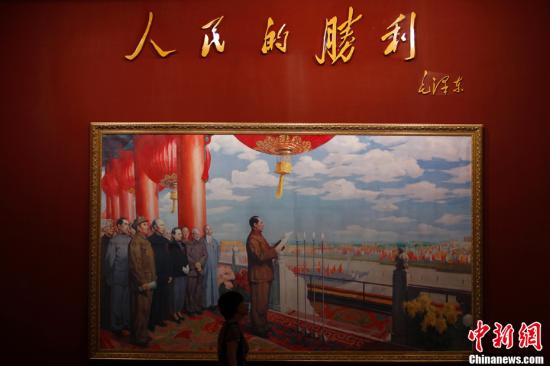China News Service, Beijing, February 19 (Guo Chaokai) Speaking of the founding generals of New China, the top ten generals such as Zhu De, Peng Dehuai, and Liu Bocheng, and the ten generals such as Su Yu, Xu Haidong and Chen Geng, have names like Lei Guaner.
However, what is not well known is that many of them have changed their names, and some have even changed their names many times.
Why did these founding generals change their names?
What kind of historical memory is behind it?
Data map: Yan'an Revolution Memorial Hall.
China News Agency issued Tomita photo
Looking at the name change experience of the founding generals, three aspects are considered the most:
One is Mingzhi, which is the main reason why most founding generals changed their names.
Peng Dehuai, formerly known as "Peng Dehua", changed his name to Peng Dehuai when he was in Changsha for the Hunan Army Officer's Lecture Hall, which means "a gentleman has virtue."
He told his wife that he didn't want to get promoted and make money, buy land and buy land, but to be a moral person who would do more for the people.
Another person who changed his name to Mingzhi was "Commercial Marshal" Xu Xiangqian, his original name was "Xu Xiangqian" with the word Zijing, and his name was changed to always alert himself to charge forward and fight through the fire for the revolution.
Ye Jianying deliberately changed her name from "Yiwei" to "Jianying" when she was admitted to Yunnan Jiangwutang, determined to be a "sword of the people", and fight bravely for the country and the people.
The founding general Xu Guangda was originally named "Xu Dehua". Before he was assigned to the Honghu base to engage in armed struggle, he changed his name to Xu Guangda, intending to reach the bright side through unremitting struggle.
In the era of arduous revolution, many CCP members changed their names to hide their whereabouts in order to preserve the revolutionary power or carry out underground work.
Founding Lieutenant General Kuang Rennong was originally named "Kuang Youhuai", and he used the name "Kuang Shilin".
After joining the guerrillas in Xunwu, Jiangxi in 1928, he clashed with the local reactionary forces.
In order to cooperate with the work of the party organization, he changed his name to Kuang Rennong, secretly developed the Xunwu Farmers Association, and helped the Red Army recruit viable forces.
Zhou Jiyi, another founding major general, had a similar experience.
Formerly known as "Li Songli", he was sent to the 69th Army of the warlord Shi Yousan in April 1938 to carry out underground work.
Before departure, Li Songli abandoned his original name and changed his name to Zhou Jiyi.
This name is derived from his middle school Chinese teacher Zhou Zifan. He who remembers Shien took the Zhou character as his surname, and "Jiyi" evolved from the Zhou character.
In addition, some founding generals changed their names to mourn their comrades in arms.
Founding major general Wang Yi was originally named "Wang Shande". During the Long March, his village friends Wang Lunshan and Yi Tianrun, who joined the Red Army with Wang Shande, died one after another.
In order to remember the two close comrades forever, Wang Shande used the last names of the two friends as "Wang" and "Yi" to show his memory.
The reasons and considerations for the founding generals to change their names and surnames are different, but behind these stories, it happens to confirm a sentence: selfless and selfless, only fighting for the nation.
On the other hand, the great rejuvenation of the Chinese nation cannot be achieved easily at present.
Overcoming the risks and challenges on the road ahead requires selfless dedication and the state of "selflessness".
What General Secretary Xi Jinping said, "I will have no self, and will live up to the people" is precisely the original intention of generations of Chinese Communists for the country and the people.
(Finish)

